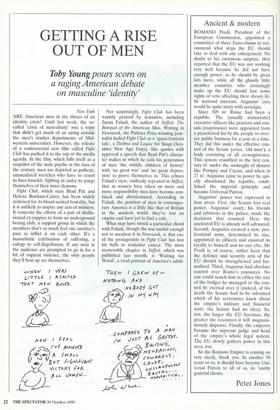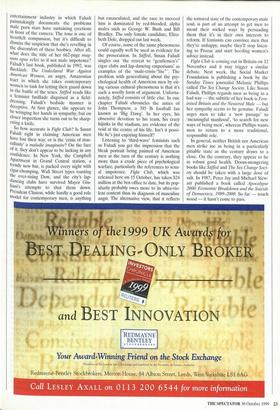GETTING A RISE OUT OF MEN
Toby Young pours scorn on a raging American debate on masculine 'identity'
New York ARE American men in the throes of an identity crisis? Until last week, the so- called 'crisis of masculinity' was a topic that didn't get much of an airing outside the men's studies departments of Mid- western universities. However, the release of a controversial new film called Fight Club has pushed it to the top of the media agenda. In the film, which bills itself as a snapshot of the male psyche at the turn of the century, men are depicted as pathetic, emasculated wretches who have to resort to bare-knuckle fighting in order to purge themselves of their inner demons.
Fight Club, which stars Brad Pitt and Helena Bonham-Carter, has been widely criticised for its blood-soaked brutality, but it is unlikely to inspire any acts of mimicry. It concerns the efforts of a pair of disillu- sioned ex-yuppies to form an underground boxing club, a support group in which the members don't so much feel one another's pain as inflict it on each other. It's a masochistic celebration of suffering, a eulogy to self-flagellation. If any men in the audience are prompted to go in for a bit of copycat violence, the only people they'll beat up are themselves. Not surprisingly, Fight Club has been warmly praised by feminists, including Susan Faludi, the author of Stiffed: The Betrayal of the American Man. Writing in Newsweek, the Pulitzer Prize-winning jour- nalist hailed Fight Club as a 'quasi-feminist tale', a Thelma and Louise for Snags (Sen- sitive New Age Guys). She quotes with approval a speech that Brad Pitt's charac- ter makes in which he calls his generation of men 'the middle children of history' with `no great war' and 'no great depres- sion' to prove themselves in. This echoes Faludi's view, endlessly repeated in Stiffed, that as women have taken on more and more responsibility men have become con- fdsed and disorientated. According to Faludi, the position of men in contempo- rary America is a little like that of Britain in the modern world: they've lost an empire and have yet to find a role.
What may have struck a particular chord with Faludi, though she was tactful enough not to mention it in Newsweek, is that one of the protagonists in Fight Club has lost his balls to testicular cancer. The most memorable chapter in Stiffed, which was published last month, is 'Waiting for Wood', a vivid portrait of America's adult-
entertainment industry in which Faludi painstakingly documents the problems male porn stars have sustaining erections in front of the camera. The tone is one of heartfelt compassion, but it's difficult to dismiss the suspicion that she's revelling in the discomfort of these boobies. After all, what does the title of her 662-page mag- num opus refer to if not male impotence? Faludi's last book, published in 1992, was Backlash: The Undeclared War Against American Women, an angry, Amazonian tract in which she takes contemporary women to task for letting their guard down in the battle of the sexes. Stiffed reads like a feminist fusillade disguised as a field- dressing. Faludi's bedside manner is deceptive. At first glance, she appears to be wringing her hands in sympathy, but on closer inspection she turns out to be sharp- ening a knife.
So how accurate is Fight Club? Is Susan Faludi right in claiming American men have lost their way, or is the 'crisis of mas- culinity' a maladie imaginaire? On the face of it, they don't appear to be lacking in any confidence. In New York, the Campbell Apartment in Grand Central station, a trendy new bar, is packed every night with cigar-chomping, Wall Street types toasting the ever-rising Dow, and the city's lap- dancing clubs have survived Mayor Giu- liani's attempts to shut them down. President Clinton, while hardly a good role model for contemporary men, is anything
but emasculated, and the race to succeed him is dominated by red-blooded, alpha males such as George W. Bush and Bill Bradley. The only female candidate, Eliza- beth Dole, dropped out last week.
Of course, some of the same phenomena could equally well be used as evidence for the prosecution. In Stiffed, Susan Faludi singles out 'the retreat to "gentlemen's" cigar clubs and lap-dancing emporiums' as examples of the 'male-crisis-"lite" '. The problem with generalising about the psy- chological health of American men by cit- ing various cultural phenomena is that it's such a woolly form of argument. Unfortu- nately, Stiffed consists of little else. In one chapter Faludi chronicles the antics of John Thompson, a 385 lb football fan known as 'Big Dawg'. In her eyes, his obsessive devotion to his team, his crazy hijinks in the stadium, are evidence of the void at the centre of his life. Isn't it possi- ble he's just enjoying himself?
Listening to 'third-wave' feminists such as Faludi you get the impression that the bleak portrait being painted of American men at the turn of the century is nothing more than a crude piece of psychological warfare, particularly the references to sexu- al impotence. Fight Club, which was released here on 15 October, has taken $24 million at the box office to date, but its pop- ularity probably owes more to its ultra-vio- lent content than its diagnosis of masculine angst. The alternative view, that it reflects
the tortured state of the contemporary male soul, is part of an attempt to get men to mend their wicked ways by persuading them that it's in their own interests to reform. If feminists can convince men that they're unhappy, maybe they'll stop listen- ing to Prozac and start heeding women's advice instead.
Fight Club is coming out in Britain on 12 November and it may trigger a similar debate. Next week, the Social Market Foundation is publishing a book by the Sunday Times journalist Melanie Phillips called The Sex Change Society. Like Susan Faludi, Phillips regards men as being in a bad way — the subtitle of her book is Fem- inised Britain and the Neutered Male — but her sympathy seems to be genuine. Faludi urges men to take a `new passage' to 'meaningful manhood', `to search for new ways of being men', whereas Phillips wants men to return to a more traditional, responsible role.
In general, neither British nor American men strike me as being in a particularly pitiable state as the century draws to a close. On the contrary, they appear to be in robust good health. Doom-mongering books like Stiffed and The Sex Change Soci- ety should be taken with a large dose of salt. In 1987, Peter Jay and Michael Stew- art published a book called Apocalypse 2000: Economic Breakdown and the Suicide of Democracy, 1989-2000. So far — touch wood — it hasn't come to pass.



























































































 Previous page
Previous page